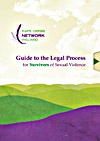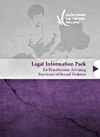Reporting to the Police
The staff in your local Rape Crisis Centre will give you, or help you to get, all the information you need so that you can decide whether to report the assault to the police or not. If you decide to go to the Gardaí/police, a Rape Crisis Centre can arrange this for you. An Garda Síochána is the police force in the Republic of Ireland. The Police Service of Northern Ireland (PSNI) is the police force in Northern Ireland. If you prefer, you can give your statement to the Gardaí/police in the Rape Crisis Centre rather than at the station.
Accompaniment Support
In the Republic of Ireland, you can be accompanied to forensic medical examinations, to any meeting with the Garda, or to Court, by a specially trained Rape Crisis Centre volunteer whose role is to support you. A volunteer will come to the Sexual Assault Treatment Unit (SATU) whenever a forensic examination is requested, but you can say you would prefer to be alone or have someone else come to support you instead. You can ask your local Rape Crisis Centre to arrange Garda or Court accompaniment for you in advance, even if you are not a client of the Centre.
In Northern Ireland, Independent Sexual Violence Advisors (ISVAs) can support you at any stage of the criminal justice process, including when you decide whether to report or not. See www.victimsupportni.com for more details about how to contact ISVAs.
If you decide to go to the Gardaí/police, the following information will help you:
- Bring someone you feel comfortable with. Rape Crisis Centres can arrange for you to be accompanied if you wish. Generally, you have the right to have that person stay with you. In the Republic of Ireland, you can also be accompanied by a lawyer and if the police object to a particular person accompanying you, they should tell you that you are still entitled to have someone else with you and the statement taking may be postponed for that person to accompany you.
- Make a note of the names of any Gardaí/police officers or detectives you have significant contact with from the time you first report the rape or assault.
THE GARDAİ/POLICE HAVE A DUTY TO KEEP YOU INFORMED OF THE PROGRESS OF YOUR CASE
- You may ask to speak to a female Garda/police officer, if you prefer.
- If you are reporting a recent assault, take a full change of clothes with you as the police may keep the clothes you were wearing to gather forensic evidence.
- Do not take any alcohol or drugs, but if you have done so or are still under the influence this should not stop you from reporting.
- If reporting a recent assault or rape to the Gardaí/police, report it as soon as possible. There is no time limit but valuable forensic evidence is quickly lost.
- The Gardaİ/police will ask you a lot of questions but these should be relevant to your case.
- You can ask for a break at any time.
- You will be asked to make a formal written statement to the Gardaí/police, usually by appointment soon after you first report the crime. This is a detailed description of what happened before, during and after the assault. Make sure you read your statement carefully and change it if necessary, before you sign it. You have the right to, and should ask for, a typed copy. If you remember other details later on, you can make a supplementary statement.
- If the person who assaulted you can be identified, the Gardaí/police may interview them soon after you make your statement.
- If you don’t know the person who assaulted you and the Gardaí/police arrest a suspect, they may ask you to look at photographs, attend an identity parade or go with police to where the assault happened to try to identify the person.
If you feel you are not being treated well by the Gardaí/police at any stage, you can insist on seeing the duty officer or you can make a formal complaint.
Medical Care and Forensic Attention
You may be reluctant to see a doctor after a sexual assault but there are good reasons for doing so
- You may have internal or external injuries that need attention.
- You need to be tested for sexually transmitted infections.
- You may be pregnant and need to know your options.
- You may want evidence gathered in case you decide to report the rape or sexual assault. Reporting may involve a medical and forensic examination. In the Republic of Ireland, if you are over 18, you have the option of having your intimate samples stored after the forensic examination, for 12 months before deciding whether to report to the Gardaí. This is known as “Option 3”.
- You may want support when going for medical help. You could ask a friend or relative, or contact your nearest Rape Crisis Centre and a staff member will go with you.
Whom should I see?
You may want to see your own family doctor (GP). However, if you are reporting or thinking about reporting the assault to the police, the doctor or nurse who examines you might need to appear in court to give the medical and forensic evidence and it is better that she or he has training and experience in this.
Your local Rape Crisis Centre can tell you about the nearest centre or doctor that specialises in medical and forensic examinations. This will be:
- a Sexual Assault Treatment Unit (SATU) if the assault happened in the Republic of Ireland,
- a PSNI Rape Crime Unit if the assault happened in Northern Ireland. The PSNI Rape Crime Unit would normally take you to the nearest Rape Suite for medical and forensic examination,
- an experienced doctor, if a SATU or PSNI Rape Suite is not available.
A forensic examination
In a forensic examination, a specially trained doctor or nurse will collect evidence from your body that may be used to prosecute the person who assaulted you. Doctors and nurses in Sexual Assault Treatment Units and Rape Suites are trained to collect the forensic evidence and to testify about that evidence in court, if necessary.
The doctor or nurse will also examine you to make sure that you are alright. If you have any injuries that need immediate care, you will get medical treatment before the forensic examination.

 Guide to the Legal Process for Survivors of Sexual Violence
Guide to the Legal Process for Survivors of Sexual Violence Legal Information Pack for Practitioners Advising Survivors of Sexual Violence
Legal Information Pack for Practitioners Advising Survivors of Sexual Violence